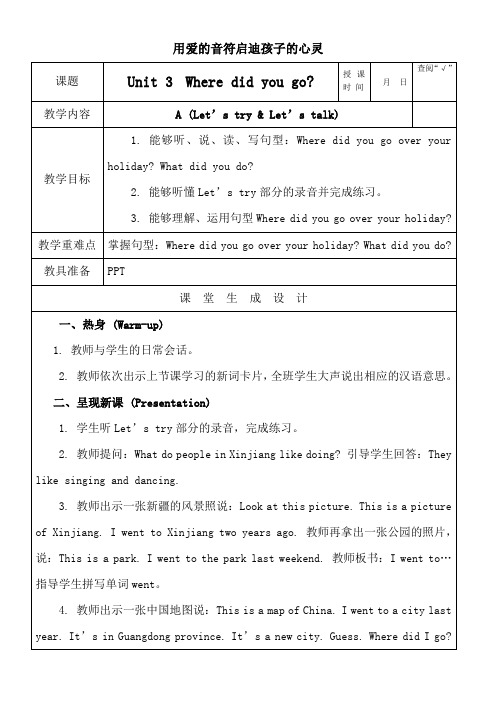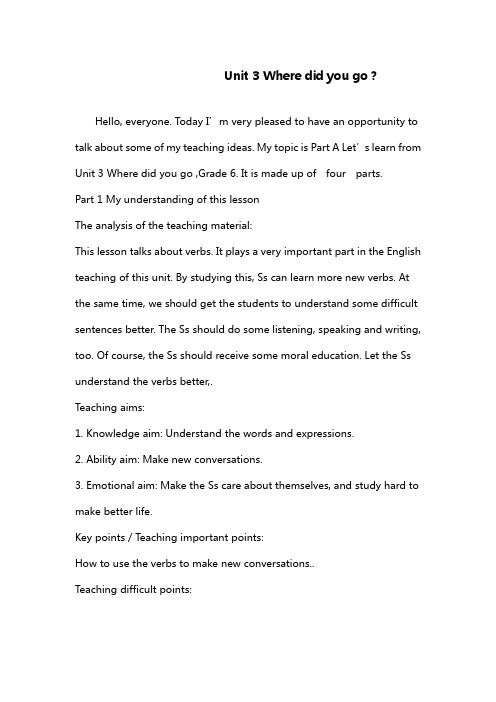PEP六年级英语下册unit 3 part B Let's learn
人教版(PEP)英语六年级下册 Unit 3 A Let’s learn(教案)

Unit 3 Where did you go?Part A Let’s learn一、教学目标1. 能够听、说、读、写有关周末活动的词组:rode a horse, rode a bike, went camping, went fishing, hurt my foot2. 能够在情景中运用句型“Where did you go last Saturday? What did you do there?”询问并回答周末去过哪里和做过什么。
3.培养学生积极乐观的心态。
二、教学重难点重点:1. 能够听、说、读、写有关周末活动的词组:rode a horse, rode a bike, went camping, went fishing, hurt my foot2. 能够在情景中运用句型“Where did you go last Saturday? What did you do there?”询问并回答周末去过哪里和做过什么。
难点:能够在情景中运用句型“Where did you go last Saturday? What did you do there?”询问并回答周末去过哪里和做过什么。
三、教学准备课件,音频,视频四、教学过程五、板书设计Unit 3 Where did you go?Part A Let’s learnPhrases:rode a horse, rodea bike, went camping, went fishing, hurt my footSentences:Where did you go last Saturday?What did you do there?。
新版PEP小学英语六年级下册Unit3教学设计

3.能够理解、运用句型Where did you go over your holiday?
教学重难点
掌握句型:Where did you go over your holiday? What did you do?
教具准备
PPT
课堂生成设计
一、热身(Warm-up)
四、课堂作业:1.将本节课学习的新单词抄写在四线三格内。
2.读B. Let’s learn部分内容。
2. Hang–man game.
Watch,wash,clean,play,visit.
3.做游戏,Guess, what’s my favourite animal?让学生描述他们喜欢的动物,引导他们这么说:It’s my favourite animal. It’s…cm tall. Its tail is…cm long. It likes to eat…It can…Guess, what’s this?
3.教师问学生:What do you usually do on Sundays?
4.教师再次出示日历,圈出上个星期天的日子,然后问学生:What was that day?引导学生回答:It was last Sunday.板书并带读单词:last。教师:It was last Sunday. It was the last weekend.板书、解释并朗读词组:last weekend。
Ss: Good morning, teacher. Nice to see you, too.
T: How are you today?
Ss: Fine, thank you.
T: S1, Where did you go last weekend?
人教版PEp英语六年级下册Unit 3 Part A Let's learn.英文说课稿

Unit 3 Where did you go ?Hello, everyone. Today I’m very pleased to have an opportunity to talk about some of my teaching ideas. My topic is Part A Let’s learn from Unit 3 Where did you go ,Grade 6. It is made up of four parts.Part 1 My understanding of this lessonThe analysis of the teaching material:This lesson talks about verbs. It plays a very important part in the English teaching of this unit. By studying this, Ss can learn more new verbs. At the same time, we should get the students to understand some difficult sentences better. The Ss should do some listening, speaking and writing, too. Of course, the Ss should receive some moral education. Let the Ss understand the verbs better,.Teaching aims:1. Knowledge aim: Understand the words and expressions.2. Ability aim: Make new conversations.3. Emotional aim: Make the Ss care about themselves, and study hard to make better life.Key points / Teaching important points:How to use the verbs to make new conversations..Teaching difficult points:1. Use your own words to make new conversations..2. Discuss where they went and what they did.Something about the Ss:1.The Ss have known something about what sb did in the past.2. They don’t often use English to express themselves and communicate with others.3. Some Ss are not active in the class because they are afraid of making mistakes.Part 2 My teaching theories, methods and aidsBefore dealing with this lesson, I’ll do my best to carry out the following theories: Make the Ss the real masters in class while the teacher himself acts as director; Combine the language structures with the language functions; Let the students receive some moral education while they are learning the English language.Teaching method:Double activities teaching methodQuestion-and-answer activity teaching methodWatch-and-listen activityFree discussion methodTeaching aids:1.some cards2.some objects3. a tape recorder4. the blackboardPart 3. Teaching steps / proceduresI have designed the following steps to train their ability of listening, speaking, reading and writing.The entire steps are:Greetings, Revision, Lead-in and reading, Preparation for details of the lesson, Consolidation, Discussion, Homework.Step 1 GreetingsGreet the whole class as usual.Step 2. Revision1. T: Act,let the Ss guess.2.Ask students some questions to revise the last lesson(show them on the screen).a. What did you do last Saturday?b. What did he do last Sunday?c. What did he do yesterday?d.What did you do last Monday?Step 3. Lead-in and preparationShow them some pictures and let them talk each other, and then use the pictures about places and the things we or they did in the past . Purpose: Arouse the students’interest of study.Bring in new subject: Where we or they went and what we or they did there.Method: Talk about the pictures , read the words and expressions and act.Purpose: Help the Ss remember the words and expressions best.Step 5. Play a game.Look, act and guess.Purpose: Make the Ss learn the expressions best and feel interesting. Step 6. ConsolidationRead the words and expressions , finish the conversation. Purpose: Let the Ss can communicate better.Step 7. DiscussionShow them some words and expressions, let the Ss talk freely. Purpose: Give the Ss much ,they can give us more.Step 8. Listening and exercise.Purpose:Improve the Ss listening and writing ability .Step 9. SummaryLet the Ss make a summary.Purpose:Let the Ss remember the lesson better.Step 10. HomeworkRead the words and expressions and make new conversations.Part 4. Blackboard designUnit 3 Where did you go?A: Where did you go_____? go went camping / fishing B: I went to ____________. ride rode a horseA:What did you do there? rode a bikeB: I ___________________. hurt hurt my footThat’s all , Thank you for listening!。
PEP英语---六年级下册--第三单元--Where-did-you-go知识讲解

Summary
(听、说、认读、写)词汇: rode a horse, rode a bike, went camping, hurt my foot, went fishing
知识点3
如何问答身高
课文原句:—Where did you go? —Mt.Tianshan,Xinjiang.
想知道对方在过去的时间里去了哪里,我们可 以这样问答:
Where did you go(+表示过去的时间)? (I/We went to+)地点 例如: Where did you go over your holiday? Where did you go last Sunday?
hurt的过去式:hurt
I__aw_ls_eo_n_t_c_a_m__p_in_g_ and _w_e_n_t__f_is_h_i_n_g_
with my family.
go camping went camping
go fishing went fishing
或点击此处播放视频
点 击 图 片 , 播 放 视 频
What did he do?
Where did you go over your holiday?
I went to Mt.Tianshan,Xinjiang with my family.
What did you do there?
I__r_o_d_e__a__h_o_r_s_e_
there.
Lead in
pep六年级英语下册第三单元_B_Let's_learn

At the Zoo
Last weekend I went to the zoo. What did
you do? I fed the bears and crocodiles. And the baby kangaroo.
What did you do on Saturday? What did you do? Tell me what you did last night. And I’ll tell you what I did, too.
went swimming
went hiking
went fishing
Look at the pictures again and finish the passage.
It was Saturday. John _____________. went to a park He played went swimming football with his friends. Wu Yifan _______________. read a book at home. Mike ___________ went hiking Chen Jie ___________ went fishing with his parents. Zhang Peng _____________. They all had great fun.
Zip: What did you do Sunday Zip: What did you do Sunday Zip: That was a busy weekend. morning? afternoon? Zoom: Yes, it was. Now I need Zoom: I cleaned my room. Zoom: I played football. another weekend. I visited my grandparents. I watched TV.
六年级下册英语教案Unit3WheredidyougoPBLetx27slearn∣人教PEP

PEP英语六年级下Unit3 Where did you go?PB Let's learn教学设计课题PB Let’s learn 单元Unit 3 学科英语年级六年级学习目标情感态度和价值观目标学生能够与他人交流假期的生活,培养他们与人沟通的能力。
能力目标1.能够在真实语境中运用所学的单词和句型。
2.能够对于假期生活进行简单对话。
知识目标 1.听说读写单词和词组:ate, took, bought, gift, took pictures.2.听说认读句子:How was your summer holiday? It was good. I went fishingevery weekend and took lots of pictures.重点听说读写单词和词组:ate, took, bought, gift, took pictures.。
难点掌握不规则动词的过去式。
学法TPR学习法,对话法教法单词教法,情景教学教学过程教学环节教师活动学生活动设计意图导入新课 1.Read and act the dialogue on Page 26.2.Write the past tense.go—_____is—_____ride—______hurt—______do—______see—______have—______sleep—______1.朗读对话并表演。
2.口头回答并拼读动词过去式。
朗读表演对话是对上节课的复习回顾,选择一组或两组进行表演,可以活跃气氛。
对已经学过的不规则动词过去式进行复习,也是对新知识的铺垫。
讲授新课1.Learn the phrase:ate fresh food出示一些新鲜食物的图片和坏掉的食物图片,引出fresh food. 依次学习4个新词,能够朗读、会说并理把要学习的四个新词用Wu Yifan的暑假活动来串T: Wu Yifan went to Dalian last summer holiday.Every morning, he ate fresh food.(出示图片)2. T: He liked the weekend very much. Guess whatdid he do every weekend?(出示图片一小部分) ——He went swimming.教学went swimming,与went fishing, went camping, went boating做比较归类。
新PEP小学英语六年级下册Unit3-Where-did-you-go-A-Let's-learn-课件资料讲解

went fishing
went camping
Catch the plane 找飞机,看谁快
rode a bike
rode a horse
did
slept
hurt my foot
drank fixed
saw
Game
What did Jo整单词
went fishing went shopping
went swimming went hiking
: Did you do anything else?
Yes,I rode a horse and then I rode a bike.
rode a horse ride a horse
rode a bike ride a bike
: What happened then?
hurt-----hurt
Oh, I hurt my foot.
He rode a bike ,and he hurt his foot.
hurt his foot
hurt my foot hurt my foot
hurt my head hurthumryt hmayndarm
w
f
.
w
c.
r ab
.
h
my f .
r
ah
.
拼拼写写:
/ rәud ә baik /
/ went `fi⌠iŋ /
/ went tu: ә pa:k /
/ went cæmpiŋ /
/ hә:t mai fut /
拼拼写写:
/ rәud ә baik /
/ went `fi⌠iŋ /
/ hә:t mai fut / / went tu: ә pa:k /
pep六年级英语下三单元教案

Unit 3 单元内容分析
教材分析
一、单元教学目标
1、能力目标
(1)能听懂会说认读本单元关于形容词比较级的单词。
(2)能听、说、读、写Let’s learn中黑体部分的内容和Read and write中要求的内容。
(3)能用目标语言完成本单元的任务型活动。
(4)了解发音特点,并能试着拼读简单的规则词。
2、知识目标
(1)能听、说、读、写单词及短语
(2)能够听、说、读Part A、Part B部分Let’s learn、Let’s talk中的单词和句子。
(3)了解Story time 、Good to know等部分的内容。
(4)了解C部分音标在单词中的基本读音。
二、单元教学课时安排:五课时
教材说明
1.本单元的中心话题是询问身边的人身体状况。
内容涉及各种常见病痛等等。
2.本课时通过人物身体状况的对比,展示了要求学生掌握的问别人身体状况的句型。
3.本课时的教学重点是能够听、说、读、写一些常见病痛的短语。
课时计划
课时计划
课时计划
课时计划
课时计划
课时计划
课时计划。
- 1、下载文档前请自行甄别文档内容的完整性,平台不提供额外的编辑、内容补充、找答案等附加服务。
- 2、"仅部分预览"的文档,不可在线预览部分如存在完整性等问题,可反馈申请退款(可完整预览的文档不适用该条件!)。
- 3、如文档侵犯您的权益,请联系客服反馈,我们会尽快为您处理(人工客服工作时间:9:00-18:30)。
He bought …
Robin is not for sale !
how much 询问价钱
Repeat
许多新鲜食物
拍了…的照片
给…买礼物ຫໍສະໝຸດ Exercise用所给单词的适当形式填空。
1.I ate (eat)fish and chicken yesterday.
2.He bought (buy) gifts for me last summer
took pictures
bought gifts
chant
How was your summer holiday, Yifan?
你的暑假过得怎么样,一凡?
It was good. I went swimming every weekend and took lots of pictures. 很不错,我每个周末都去游泳了, 并且拍了许多照片。
Can you say?
Did you go to the hospital ?
Yes
, I
did
.
What did doforest there? Did you goyou to a park ?
I
rode a horse
Yes
, I
did
.
.
Where did you go? Did you go to the cinema ?
take picture of 拍了...的照片
What did he do last summer holiday?
He bought gifts .
买 (buy的过去式)
bought gifts
买礼物
Guess!
Who did Wu Yifan buy gifts for?
buy gifts for 给...买礼物
He went swimming .
go的过去式
went swimming
去游泳
What did he do last summer holiday?
He took pictures .
take的过去式
took pictures
照相
the the flowers dog He took pictures of_______.
holiday.
3.How much (much/many) are the shoes? 4.He took pictures of (of/for) food.
It is never too late to learn.
活到老,学到老。
What did you do there?
I took pictures .
What did he do there?
He ate fresh food .
What did he do there?
He bought gifts .
Let's learn
ate fresh food went swimming
Unit 3 Where did you go?
Part B Let's learn (P27)
Catch the plane
Where did you go? rode a horse rode a go bike Did you to Turpan?
Are you all right? What happened? went fishing went camping It looks like a mule. I'm OK now. hurt my foot
He ate fresh food 吃(eat的过去式) .
暑假
ate fresh food 吃新鲜的食物
What did Wu Yifan eat?
He ate fresh vegetables. fish. fruits.
What did he do last summer holiday?
his father He bought gifts for_________.
ate
took
went
bought
ate fresh food
went swimming
took pictures
bought gifts
Can you say?
What did you do there?
I went swimming .
No I bookstore didn't . I went to ,the
.
Where did you go? Did you go to Beijing ?
Turpan
吐鲁番
No I didn't . I went to ,Turpan
.
New words
What did Wu Yifan do last summer holiday?
暑假
Example
How was your summer holiday, Yifan?
It was good. I ate fresh food everyday and bought gifts.
Look and say
Last summer holiday, Andy ate … He took pictures of … He went …
